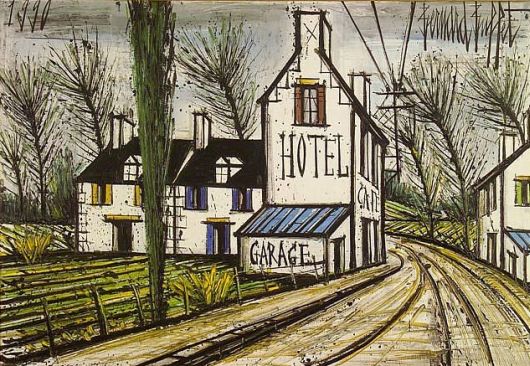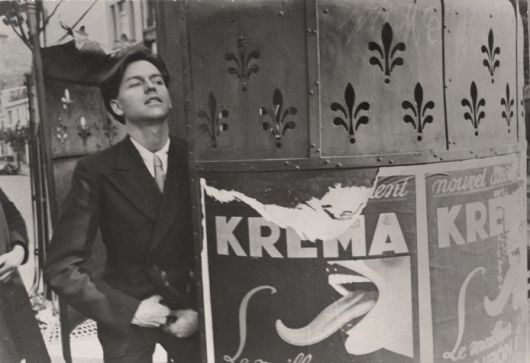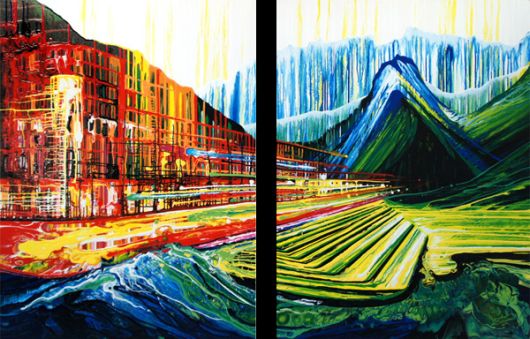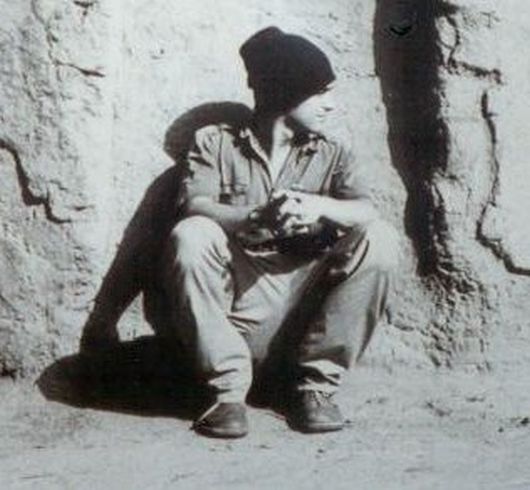 BOOKS
BOOKS In Which We Simply Cannot Go Back to Them
 Friday, May 2, 2014 at 11:32AM
Friday, May 2, 2014 at 11:32AM 
The Bottom Row Of Ribs
by CHARLES HENRI FORD
This is the second in a series. You can read the first part here.
I took a terrace walk and saw the most brilliant falling star — I always make the same wish: Love.
+
Why is everyone always foolish enough to think that a sexual partner will make life happy?
I went ahead and became a homosexual — no matter what. Not everybody does that — who should (or would like to). All the fucked up lives — just because they weren't fucked.
A virtue of necessity? More usually a vice is made of it.
+
One of the most attractive "sections" of the bodies of young people: from the bottom row of ribs to the pubic hair. (Pav would include the pubic hair.) It's so flat, and intact, so undisintegrated, unmarked with sags or superfluous fat. It's beautiful. I think of that section of Rocco, of Benito, of Vito.

+
The shapes of the head of the soul. When bell-mouthed, what is the significance?
+
I enjoy life when, as Virginia Woolf puts it, "Quiet brings cool clear quick mornings, in which I dispose of a good deal of work and toss my brain into the air when I take a walk." But Djuna and I didn't thrill to Woolf's Orlando. Did I not read some of it aloud to her, that winter on the rue St.-Romain, in that lovely apartment, the heart- shaped big mirrors framed in gold, the studio bed, piled high with pillows covered in a variety of "ecclesiastical" cloths, some gold-embroidered? Her big bed, in the bedroom, had lots of little lacey pillows on top of it in the daytime. She'd go once a week to get her hair curled and tinted, strawberry blonde.
I was infatuated by her (rather than with her). And she was attracted by me — all the way to Tangier — but there I lost my charm for her because of my — selfishness — I didn't give her enough (my re-typing Nightwood was hardly enough, and a drunken lay now and then). I spent mornings at the beach, leaving her alone in the little Casbah house. And when she ceased being charmed, she quickly lost her charm for me. I didn't like the kind of mirror she became.
"This ravaging sense of the shortness..." (V.W.) I don't have that. I sense, rather, that life will be long — too long.
+
Gino would have spent the night in my double bed but I decided not to let him — he said he could feel friendship for a man — even imagine sacrificing his life for that friendship — but it's the woman whom he feels made to make love to... if he makes it at all.
He's a pleasant friend, nice to have around, handsome to look at, true-hearted, and I'm glad he came on this visit, though he is less a poet now and admits it.
Pavlik: "He just thinks you're a selfish American bitch — he's not very far from the truth — if you think you're something else you're mistaken."
+
I could write a comedy (but would I want to) with three main characters as follows:
A young writer.
An older painter.
The young writer's mother.
The "plot" — as made by the characters — would be the mother's attempt to get her son away from the older man — and her failure.
The setting: a New York penthouse.
One of subsidiary characters: a balletomane (based on Lincoln Kirstein's personality), who is a close friend of the painter's, and would also like to see the "household" broken up.

+
I met Isak Dinesen. She was wearing a deep cloche of tobacco-colored straw. She talks rhythmically, and sounds as if she were reading one of her own stories. She said I am like what she expected me to be. I said, "You are beyond my expectations." She wore a fur jacket with longish shiny fur.
+
Thornton Wilder just phoned, asked me to come into Rome and lunch with him tomorrow... It's five to four, I'll put the water on for tea. Will no one call on me today? I'll peep through the peephole before opening door. The new breadboy is cross-eyed, curious as a cat.
I've told Pavlik that he should "paint flat." (Upstart to Master.) Anyway, he told me some days later (a couple of days ago): "I would like to paint flat." I nodded my head: "Then that would be being painting instad of painting something."
"You want to know the truth?" (I to Pavlik.)
"What?"
"Matisse couldn't draw."
"That's what Gertrude Stein said."
"As for Braque — he drew worse than Matisse."
"I know that."
+
We are taking off at this moment from La Guardia. It will be a nonstop flight to New Orleans, Washington fogged out so no landing there possible. The plane, therefore, is not full, and there is a free seat between me and the Spanish-speaking woman on my right. On that seat, in a woven basket from Mexico, is the box which contains the sealed jar of Mother's ashes.

In New York I saw Djuna and took her a little bottle of perfume (Lancome). Djuna told me over phone that she couldn't receive me for tea chez elle but perhaps they'd give us "a bun" at Luigi's. She wasn't at Luigi's when I arrived but it wasn't long before I saw an old and stooped woman walking with a stick pass by the window and I opened the door for her.
Djuna's old-time snappishness wasn't there, though she tried to bare a false tooth now and then... She did say, when she first saw me, "You've grown hardly any older - it's disgusting!" She said various London literary lights had raved over her new play (Eliot, Muir, Read) and she's mailing the revised version to Eliot on Monday.
We may value old friends, but we can't go back to them.
+
To know when to leave alone those chance happenings.
+
If I'm going to love living in Paris I'll have to get used to — even like — that pearl-gray sky which ones sees on opening the curtains in the morning.
I told him, Perhaps it's only physical, maybe I don't love you at all. He said, I think you love me.
1953-1957

"Logic of Color" - Wye Oak (mp3)
"Schools of Eyes" - Wye Oak (mp3)







































